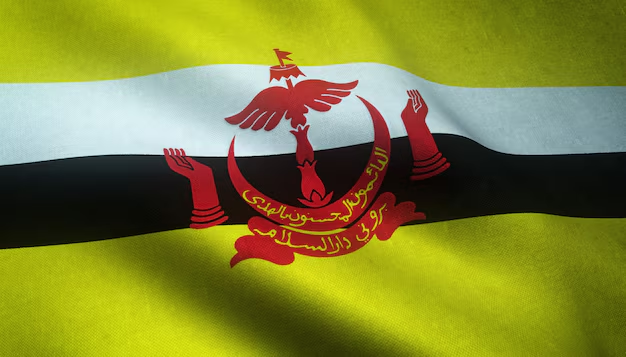Introduction
A small southeast Asian nation, Brunei is located on the island of Borneo. Mostly surrounded by Malaysia, its terrain, weather and rich natural environment plays an important role in its way of living and economy. Over 90 percent of the revenue of the government and the GDP depends on the oil reserves and natural gas. The resourcefulness and the associated wealth places Brunei at a great economic place among the Asian countries. The government's contributions to economic development are praiseworthy and welfare for citizens in health and education is widely seen. The government is constantly on a lookout for economic diversification and is investing in newer and emerging sectors. The movement towards better finance has led the country to move towards crypto markets and digital asset payment solutions to empower the economy and embrace the diversification required for upcoming development. Through this article, lets understand the economic infrastructure of Brunei better and the implications of cashless payments in the ecosystem!
Brunei’s payment infrastructure
Brunei’s payment system is evolving in a hybrid manner combining the long-standing traditional banking and a movement towards emerging digital platforms and wallets. These payment rails facilitate transactions between institutions, individuals and merchants. This infrastructure has taken a shape through the following building blocks;
- RTGS system (Real time gross settlement): this system enables real time settlement of large funds. The transaction depends on the banking system and while it settles in real time, the process of setting up is longer. Being bank coded for high value transactions, RTGS has long grown with trust and security.
- ACH (Automatic Clearing House): The system of ACH is used for batch transfers of lower value transactions like direct deposits and scheduled payments.
- e-payment gateway: this wider system supports government e-services and digital public payments. This has been an initiative with possibilities of expansion and better service.
- Digital payment hub: This is a national step towards connecting banks, online businesses, standardised QR code systems and fintechs with real-time settlements
This multilayered infrastructure has laid out a groundwork for digital banking and fintech evolution ensuring both privacy and security. These systems are regulated and looked over by the Brunei Darussalam Central Bank (BDCB) aligning together with the digital economy masterplan of 2025.
Digital evolution in Brunei
Some important digital banking initiatives have shaped the Brunei economy in the past few years facilitating for various financial activities;
- Baiduri Bank, being the leader in digital banking, has turned towards Temenos’ cloud native core banking system which has enabled the scaling of digital services, real time transaction capabilities and a wider network for business and customer services and experiences. Along with this, the launch of b.Digital has opened opportunities for the customers to swiftly manage accounts, initiate local and international payments and stay in a loop with the operations all through a mobile phone.
- BIBD (Bank Islam Brunei Darussalam) is the largest bank in Brunei and a regional leader catering to the digitization of finance through its innovative NEXGEN platform. This has enabled instant accounts, e-statements and security controls. P2P transactions and bill payments have also been made easier.
- BIBD Quickpay is a QR code payment system which has been actively adopted in retail stores and supermarkets, local stalls and other public sector outlets. Quickpay is integrated with NEXGEN wallet enabling a step toward Brunei’s movement towards a cashless society.
Real time payments and instant money transfers
Brunei’s full conversion to realtime payments and digital transfers is still in making and it lacks an aligned infrastructure for the same although catering to current needs are accommodated by the digital initiatives and platforms. For a unified system, providing a solution to all digital payment needs locally as well as across borders, the economy of Brunei is looking for;
- Instant settlement and real time transfers.
- Request to pay services.
- Universal QR interoperability.
- Open APIs for fintech solutions.
There has been a need and movement towards solutions which cater to the 24/7 finance requirements making businesses agile across the globe irrespective of the locations and time zones they are operating from. Let’s find out how Transfi solves this need and provides the best of age features to constantly advancing digital finance.
Future of Digital Payments in Brunei
The efforts aimed to reduce cash usage, efficient payment strategies inclusivity in the payment sphere have opened the financial position of Brunei to platforms like Transfi;
- API integrations: Transfi can connect local real time payment infrastructure seamlessly with payment gateways for seamless remittance flows via developer first API integrations.
- Local wallet payouts: through wallets like quickpay, Transfi would enable users to send and receive money through only a few clicks.
- Compliance and Security: operating on the blockchain Transfi provides full fledged transparency along with its PCI-DSS adoption which ensures a secure foundation of global payments and remittance partners.
Transfi provides a one stop solution for stablecoin and digital asset transaction across border and a blockchain infrastructure at viable means to accommodate,
- Seamless on ramp and off ramp services between currencies and digital assets made easy with an intuitive platform.
- A wide reach to global remote teams with compliance ready payout rails.
- Stablecoin wallet to hold and exchange currency at convenience and integration with a variety of local wallets.
- API integrations, multiple currencies, payment methods and multi chain networks for international clients.
Transfi's solutions cater to the industries thriving in Brunei and its movement towards a full fledged digital economy, making the financial whereabouts easier to handle and making newer solutions approachable along with facilitating blockchain adoption.
Also read: Stablecoin Payments in Monaco: Luxury Real Estate and Crypto Wealth Management
Conclusion
For an efficient and ever growing nation like Brunei, digital adoption of finances in every industry is the key to a potentially brighter and evolved future. With government initiatives and an influx of newer international solutions, Brunei is sure to succeed towards a digital asset and stablecoin economy with the best of all financial solutions accessible to everybody. Platforms like TransFi are helping Brunei’s economy embrace a better future with the ease of the best services and interface at power by connecting users with over 100+ currencies, 250+ local payment methods, and 80+ digital assets, giving both senders and receivers control, speed, and cost savings.
Frequently asked questions (FAQs)
- What are the benefits of digital assets for payments in Brunei?
Digital dollars like USDT and USDC provide price stability, speed, and global accessibility. They help reduce remittance costs, eliminate FX losses, and give unbanked users a way to receive and use money digitally.
- What's the safest way to accept cross border payments in Brunei?
The safest way to accept payments from across the world is through Transfi. We comply with the highest level of PCI DSS security standards through tech like tokenization, which hides transaction details in transit.
- How does Transfi facilitate API integration?
Transfi can connect Brunei’s local real time payment infrastructure seamlessly with payment gateways for seamless remittance flows via developer first API integrations.
- Why is there a need for digital payments over traditional bank transfers?
- Instant settlement and real time transfers.
- Providence of request to pay services.
- Universal QR interoperability.
- Open APIs for integrating fintech solutions.
- What’s the role of Transfi in helping Brunei embrace a digital future?
Platforms like TransFi are helping Brunei’s economy embrace a better future with the ease of the best services and interface at power by connecting users with over 100+ currencies, 250+ local payment methods, and 80+ digital assets, giving both senders and receivers control, speed, and cost savings.
Table of Contents
Suggested Article
Explore our products

Make global payments at the speed of a click

Accept payments, remove borders.

Unlock Seamless Digital Currency Transactions Anywhere
























